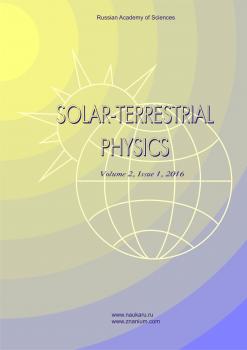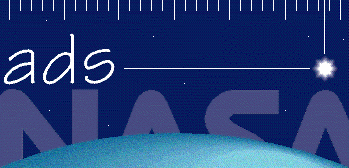Апатиты, Россия
с 01.01.1991 по 01.01.2022
Апатиты, Мурманская область, Россия
We have examined the effect of the nitrogen oxide concentration on the ratio between λ557.7 nm and λ427.8 nm emission intensities in auroras caused by precipitating electron fluxes, using the numerical simulation method. The ratio I₅₅₇.₇/I₄₂₇.₈ has been shown to strongly depend on the NO concentration: the ratio decreases from 7 to 2 with increasing NO maximum concentration at the height profile from 10⁷ to 3·10⁹. This fact is in satisfactory agreement with experimental data.The effect of nitric oxide on the ratio has been demonstrated to occur through the excitation channel of the emission λ557.7 nm, namely, the dissociative recombination of the molecular oxygen ion O⁺₂+eₜₕ due to the ion deactivation by collision reaction with nitric oxide O⁺₂+NO.
nitric oxide, 557.7 nm and 427.8 nm emissions, intensity ratio, aurora, modeling, electron precipitation
1. Dashkevich Zh.V., Ivanov V.E. Estimated nitric oxyden density in auroras from ground-based photometric data. Solar-Terr. Phys. 2019, vol. 5, no. 1, pp. 58-61. DOI:https://doi.org/10.12737/stp-51201908.
2. Dashkevich Zh.V., Ivanov V.E. Diagnostics of emission intensities and electron density in auroras based on empirical precipitation models. Solar-Terr. Phys. 2022, vol. 8. no. 2. pp. 56-60. DOI:https://doi.org/10.12737/stp-82202208.
3. Dashkevich Zh.V., Zverev V.L., Ivanov V.E. Ratios of I630.0/I427.8 and I557.7/I427.8 emission intensities in auroras. Geomagnetism and Aeronomy. 2006, vol. 46, no. 3, pp. 366-370. DOI:https://doi.org/10.1134/S001679320603011X.
4. Dashkevich Zh.V., Ivanov V.E, Sergienko T.I., Kozelov B.V. Physicochemical model of the auroral ionosphere. Cosmic Res. 2017, vol. 55, no. 2, pp. 88-100. DOI:https://doi.org/10.1134/S001 0952517020022.
5. Black G., Slander T.G., St. John G.A., Young R.A. Vacuum-ultraviolet photolysis of N2O. IV. Deactivation of N(2D). J. Chemical Phys. 1969, vol. 51, no. 1, pp. 116-121. DOI:https://doi.org/10.1063/1.1671694.
6. Brekke A., Henriksen K. The intensity ratio I(5577)/I(4278) and the effective life time of O(1S) atoms in pulsating aurora. Planet. Space Sci. 1972, vol. 20, no. 1, pp. 53-60. DOI:https://doi.org/10.1016/0032-0633(72)90140-7.
7. Deans A.J., Shepherd G.G. Rocket measurements of oxygen and nitrogen emissions un the aurora. Planet. Space Sci. 1978, vol. 26. no. 4, pp. 319-333. DOI:https://doi.org/10.1016/0032-0633(78)90115-0.
8. Fensenfeld F.C. The reaction of with atomic nitrogen and NO+ H2O and with atomic oxygen. Planet. Space Sci. 1977, vol. 25, no. 2, pp. 195-196.
9. Gattinger R.L., Vallance Jones A. The intensity ratios of auroral emissions features. Ann. Geophys. 1972, vol. 28, pp. 91-97.
10. Gattinger R.L., Harris F.R., Vallance Jones A. The height, spectrum and mechanism of type-B red aurora and its bearing on the excitation of O(1S) in aurora. Planet. Space Sci. 1985, vol. 33, no. 2, pp. 207-221. DOI:https://doi.org/10.1016/0032-0633(85)90131-X.
11. Gattinger R.L., Llewellyn E.J., Vallance Jones A. On I(5577A) and I(7620A) auroral emissions and atomic oxygen densities. Ann. Geophys. 1996, vol. 14, no. 7, pp. 687-698. DOI:https://doi.org/10.1007/s00585-996-0687-1.
12. Goldan P.D., Schmeltekopf A.L., Fehsenfeld F.C., Schiff H.I., Ferguson E.E. Thermal energy ion-neutral reaction rates. II. Some reactions of ionospheric interest. J. Chemical Phys. 1966, vol. 44, no. 11, pp. 4095-4103. DOI:https://doi.org/10.1063/1.1726588.
13. Henriksen K. Photometric investigation of the 4278 A and 5577A emission in aurora. J. Atmos. Terr. Phys. 1973, vol. 35, no. 7, pp. 1341-1350. DOI:https://doi.org/10.1016/0021-9169(73)90167-0.
14. Maseide K. Rocket measurements of the volume emission profiles for auroral glow. Planet. Space Sci. 1967, vol. 15, no. 5, pp. 899-905. DOI:https://doi.org/10.1016/0032-0633(67)90124-9.
15. Mende S.B., Eather R.A. Spectroscopic determination of the characteristics of precipitating auroral particles. J. Geophys. Res. 1975, vol. 80, pp. 3211-3216. DOI:https://doi.org/10.1029/JA080i022p03211.
16. Sergienko N.I., Ivanov V.E. A new approach to calculate the excitation of atmospheric gases by auroral electron impact. Ann. Geophys. 1993, vol. 11, no. 8, pp. 717-727.
17. Sharp W.E. NO2 continuum in aurora. J. Geophys. Res. 1978, vol. 83, pp. 4373-4376. DOI:https://doi.org/10.1029/JA083iA09p04373.
18. Sharp W.E., Rees M.H., Stewart A.I. Coordinated rocket and satellite measurements of an auroral event 2. The rocket observations and analysis. J. Geophys. Res. 1979, vol. 84, no. A5, pp. 1977-1985. DOI:https://doi.org/10.1029/JA084iA05p01977.
19. Shepherd G.G., Gerdjikova M.G. Thermospheric atomic oxygen concentrations inferred from the auroral I(5577)/ I(4278) emission rate ratio. Planet. Space Sci. 1988, vol. 36, no. 9, pp. 893-895. DOI:https://doi.org/10.1016/0032-0633(88)90096-7.
20. Shepherd M.G., Shepherd G.G. On the I(557.7 nm)/ I(427.8 nm) emission rate in aurora. J. Atmos. Terr. Phys. 1995, vol. 57, no. 8, pp. 933-943. DOI:https://doi.org/10.1016/0021-9169(94)00065-V.
21. Siskind D.E., Barth C.A., Evans D.S., Roble R.G. The response of thermospheric nitric oxide to an auroral storm 2. Auroral latitudes. J. Geophys. Res. 1989, vol. 94, no. A12, pp. 16899-16911. DOI:https://doi.org/10.1029/JA094iA12p16899.
22. Steel D.P., McEwen D.J. Electron auroral excitation efficiencies and intensity rations. J. Geophys. Res. 1990, vol. 95, no. A7, pp. 10321-10336. DOI:https://doi.org/10.1029/JA095iA07p10321.
23. Swider W., Narcisi R.S. Auroral E-region: Ion composition and nitric oxide. Planet. Space Sci. 1977, vol. 25, no. 2, pp. 103-116. DOI:https://doi.org/10.1016/0032-0633(77)90014-9.
24. Vorobjev V.G., Yagodkina O.I., Katkalov Yu.V. Auroral precipitation model and its applications to ionospheric and magnetospheric studies. J. Atmos. Solar-Terr. Phys. 2013, vol. 102, pp. 157-171. DOI:https://doi.org/10.1016/j.jastp.2013.05.007.

















